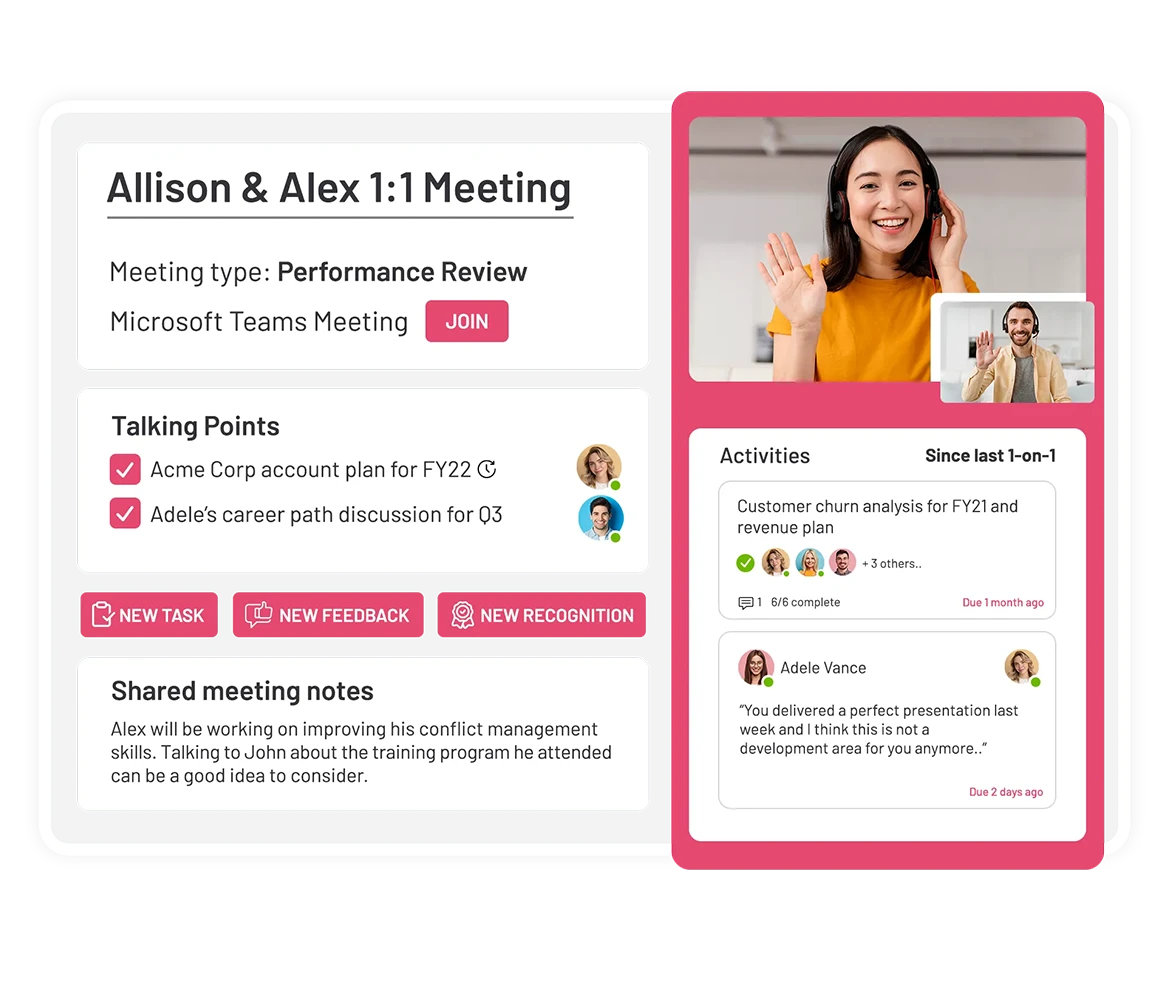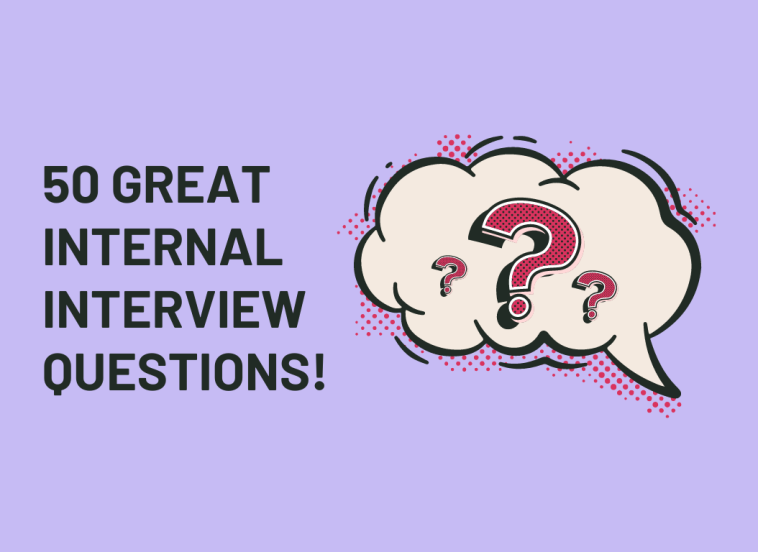When it comes to building your dream team, internal hiring emerges as a reliable approach especially considering the uncertainties associated with external recruitment.
To steer away from the risks of external hiring, such as the ambiguity of external candidates’ performance and skills, you can opt for internal hiring.
With internal hiring, you will be able to minimize these uncertainties and deepen the existing skills of your dedicated employees.
The positive impact of internal hiring is demonstrated through research as well. A study conducted with over 109,000 commissioned salespeople suggests that internal hires not only exhibit a long-term commitment to their organizations but also tend to outperform their externally recruited counterparts.
However, successful internal hiring demands a solid strategy and when it comes to creating your strategy, one great tool in your arsenal is asking the right internal interview questions.
In this article, we’ll provide you with 50 impactful internal interview questions. But that’s not all! We’ll also weigh the pros and cons of both external and internal hiring to facilitate your decision-making!
Read on to discover the best approach to internal hiring and ask the right internal interview questions!
Table of Contents
50 Internal Interview Questions
We are listing 50 great questions to ask in an internal interview to help you measure how skilled your existing employees are. Asking these internal interview questions will provide hints for the right hiring decision.
I. Internal Interview Questions About Collaboration
These internal interview questions target the collaboration skills of the internal candidates and aim to evaluate who can work effectively with their colleagues to achieve organizational goals.
Asking internal job interview questions about collaboration will help you ensure successful teamwork so you should definitely consider including them!
- Can you provide an example of a project where you played a key role in fostering collaboration among team members from different departments?
- How do you ensure that all team members feel heard and valued during collaborative discussions?
- Describe a time when you had to mediate a conflict between team members. How did you approach it, and what was the outcome?
- What strategies do you use to encourage diverse perspectives within a team to enhance collaboration?
- Share an example of when you successfully collaborated with a remote or virtual team to achieve a common goal.
- How do you build and maintain strong relationships with cross-functional partners to ensure successful project outcomes?
- Can you discuss a situation where you had to adjust your communication style to enhance collaboration with a particular team member?
- Describe a project where you had to navigate competing priorities and perspectives within the team. How did you manage it?
- In what ways do you promote a positive team culture that fosters effective collaboration and knowledge-sharing?
- Share an example of a successful team-building initiative you implemented within your department.
II. Internal Interview Questions About The Initiative
Initiative-taking can drive innovation and improve efficiency. Therefore, you need to ask internal candidate interview questions that aim to assess the candidate’s proactiveness.
These internal interview questions about the initiative will help you identify the employees who can inspire your team to go above and beyond.
- Describe a specific instance where you identified an opportunity for improvement in a process and took the initiative to implement positive changes.
- How do you proactively stay informed about industry trends and incorporate new ideas into your role?
- Share an example of when you went above and beyond your assigned responsibilities to contribute to the success of a project.
- Can you discuss a time when you proposed and implemented a new strategy that positively impacted the efficiency of your team?
- How do you encourage and support your team members in taking initiative and contributing innovative ideas?
- Describe a situation where you had to make a quick decision without direct guidance. What was the outcome, and what did you learn from it?
- Can you share an example of when you identified a potential issue before it became a major problem and took proactive steps to address it?
- How do you balance the need for detailed planning with the ability to act decisively in fast-paced situations?
- Share an instance where you demonstrated leadership by taking charge of a challenging situation and guiding your team to success.
- Discuss a project where you successfully managed to meet tight deadlines by effectively prioritizing tasks and resources.
III. Internal Interview Questions About Creativity and Innovation
To continuously progress and stay ahead, you need to build a culture that values creativity. These interview questions for internal candidates will help you identify employees who can think outside the box and come up with unconventional solutions to challenges.
- Can you provide an example of a project where you introduced a creative solution to a longstanding problem within your department?
- How do you foster a culture of innovation within your team to encourage the generation of new and original ideas?
- Describe a situation where you had to think outside the box to overcome a unique challenge. What was the result?
- Share an example of when you collaborated with others to brainstorm and implement an innovative process or approach.
- How do you stay informed about emerging technologies and trends to drive innovation in your role?
- Can you discuss a time when you successfully implemented a new idea that significantly improved the efficiency or effectiveness of your team?
- Describe a project where you had to pivot from the original plan due to unforeseen challenges. How did you adapt and innovate?
- Share an instance where you encouraged and supported team members in exploring unconventional solutions to a problem.
- How do you balance the need for structured processes with the flexibility to embrace creative and innovative approaches?
- Can you provide an example of a situation where you took calculated risks to achieve a positive outcome?
IV. Internal Interview Questions About Communication
Communication is among the building blocks of teamwork and collaboration. These internal interview questions about communication will help you identify the employees who can communicate with their colleagues effectively.
- Describe a time when you had to communicate complex information to a non-technical audience. How did you ensure understanding?
- How do you ensure that your team is well-informed about organizational changes, and how do you address any concerns that arise?
- Share an example of when you had to deliver difficult news or feedback to your team. How did you approach it, and what was the outcome?
- Can you discuss a project where effective communication was crucial to its success? How did you manage communication channels?
- How do you tailor your communication style when working with different stakeholders, such as team members, executives, or clients?
- Describe a situation where you successfully mediated a communication breakdown between team members. What steps did you take?
- Share an example of when you implemented a new communication strategy that improved team collaboration and productivity.
- How do you encourage open and transparent communication within your team to foster a positive work environment?
- Can you discuss a project where you effectively communicated with external partners or clients to achieve shared goals?
- In what ways do you use technology and tools to enhance communication and collaboration within your team?
V. Internal Interview Questions About Problem-Solving
Adaptability through effective problem-solving is among the most vital skills. By asking these internal interview questions you can assess how easy it is to come up with effective solutions for the candidates.
- Can you provide an example of a challenging problem you faced in your previous role and the steps you took to analyze and solve it?
- Describe a situation where you had to think on your feet to address an unexpected challenge. How did you handle it?
- Share an example of a project where you identified potential issues early on and took proactive steps to mitigate them.
- How do you approach decision-making when faced with incomplete or ambiguous information?
- Describe a time when you successfully implemented a solution that positively impacted the efficiency or effectiveness of your team.
- Can you discuss a project where you had to adapt your problem-solving approach due to changing circumstances? What did you learn?
- Share an example of when you collaborated with a team to troubleshoot and resolve a complex issue. What was your role?
- Describe a situation where you successfully balanced the need for quick decision-making with the importance of thorough analysis.
- How do you foster a culture of continuous improvement within your team to address ongoing challenges?
- Share an example of when you led a cross-functional team in solving a complex problem that required diverse expertise.
Internal Hiring vs External Hiring
To make an informed decision, you need to weigh the pros and cons of external and internal hiring.
The Pros Of Internal Hiring
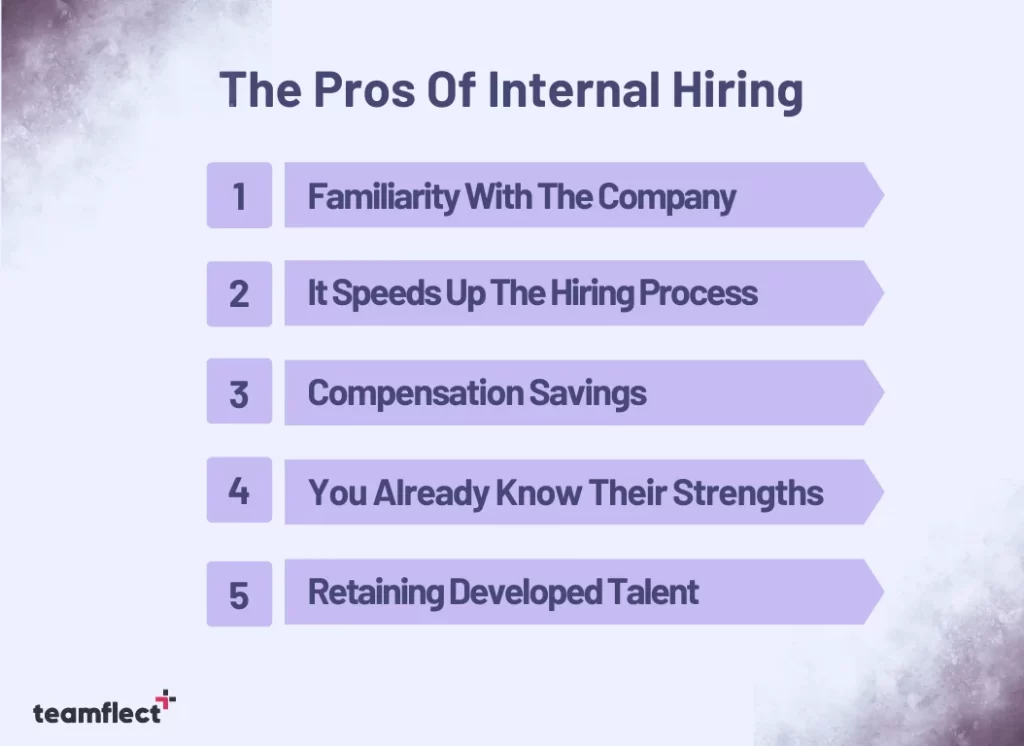
1. Familiarity With The Company: External candidates need to get familiar with your company practices and they require training, whereas internal hires will be able to apply their knowledge of your organization in their new roles and don’t require onboarding or training.
Plus, they have been working in your organization so they are familiar with your company culture.
2. It Speeds Up The Hiring Process: It takes about 24 days to hire an employee in the United States and internal hiring can significantly shorten this period. Internal hiring simply helps you save time by reducing the number of job interviews you need to conduct.
3. Compensation Savings: By hiring internally, you not only quicken the hiring process but also lower the hiring costs through compensation savings. Initial compensation for external hires is nearly 18% higher when compared to internal hires.
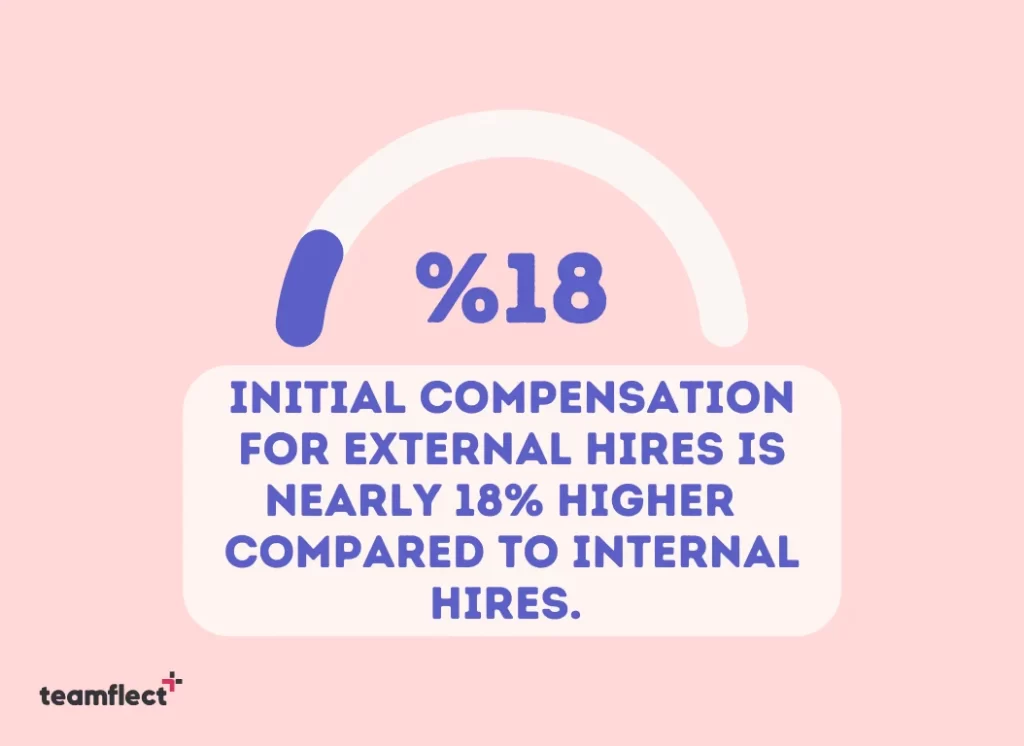
4. You Already Know Their Strengths: Hiring external candidates requires a leap of faith since there is an ambiguity surrounding how well they will perform or their strengths and weaknesses.
This doesn’t apply to internal candidates since they have been working for your company and you can access their performance history.
5. Retaining Developed Talent: As an organization, you put time, effort, and financial resources into developing talent. When you opt for internal hiring, you can retain employees who have been honing their skills.
The Cons Of Internal Hiring
1. You May Need To Backfill: Having to backfill the previous positions of the internal hires can be a disadvantage. However, the organizational structure and the workload of other employees might not always demand backfilling.
2. It Can Create Competition: Internal hiring is often linked to improved employee morale but it can also damage it by creating competition among employees. If you have several candidates who apply for the same role, things can go sour once you select one of the candidates.
The Pros Of External Hiring
1. External Candidates Can Bring Novelty: External hires can bring something new to the table. They might have different perspectives that can streamline the way you work.
2. It Allows You To Expand: When you only use internal hiring as a recruitment practice, you won’t be able to grow as a company. External hiring helps you expand your organization by adding new employees and skill sets to your workforce.
The Cons Of External Hiring
1. Takes Longer To Train: The unfamiliarity with company culture and practices can significantly extend the training period for external hires as compared to internal hires.
External hires will have to go through the onboarding process while internal hires will not require training.
2. Increases The Hiring Costs: You will spend more time and finances on advertising the vacancy to external candidates. Furthermore, since it will take longer to train external candidates, hiring them will be more costly.
How To Identify The Right Internal Candidates?
Identifying the right internal candidate is easier said than done. The trick is to track and measure employee performance on a regular basis. To do that, opt for performance management software with a strong employee review and feedback module.
While there are plenty of great software out there that we’ve highlighted in previous lists, the best way to go is to find a solution that is integrated into your main communication platform.
If you are using Microsoft Teams or Outlook on a regular basis then the best option for you would be:
Teamflect
Keeping track of all of your teams regular performance metrics such as goal completion rates, employee engagement, and more, Teamflect is a fully integrated solution that makes succession planning and internal hiring as simple as possible.
The 9 Box Talent Grid
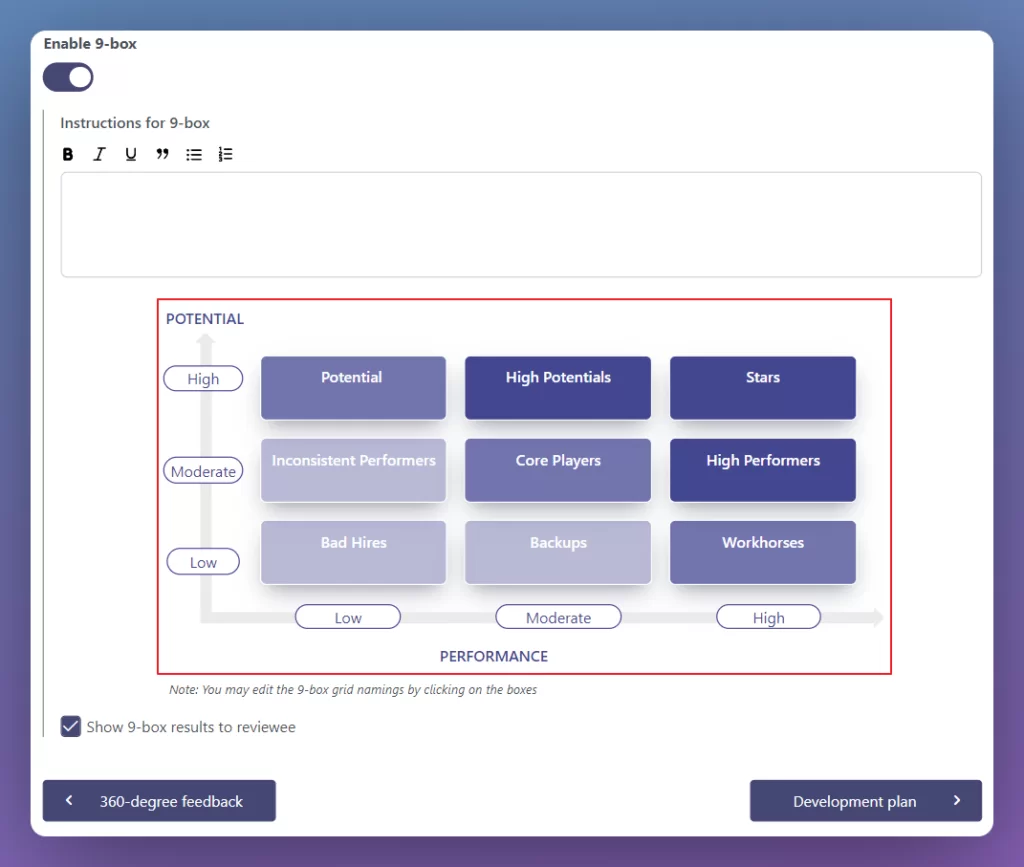
By integrating the 9 box talent grid into your performance reviews and competencies alongside 360-degree feedback data, you can make sure you always have the necessary information identify the right candidates for positions that can be filled with internal hires!
